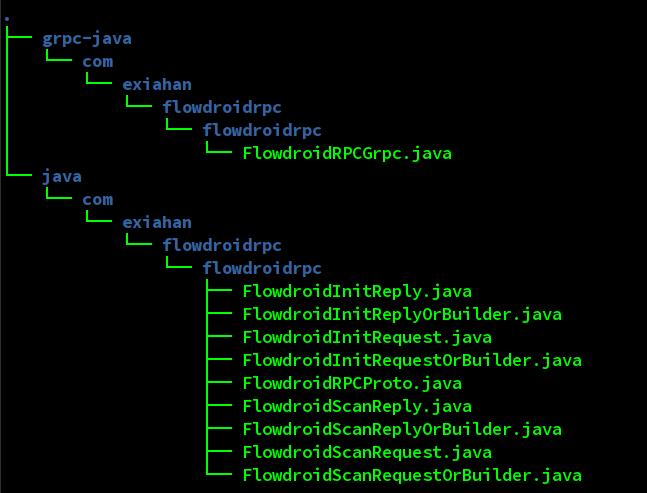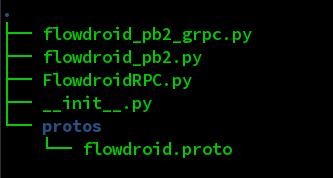Recently I am trying to integrate flowdroid into my static android application vulnerabilities scanner which is written in python with androguard used to enhance its ability of vul detection.
At first I tried JPype, it works well in my own machine and docker image, but it can not be used with k8s now because the pip package celery use fork to create child process which will hang JPype, for details can check out here. And after seek for how to change celery from using fork to spawn. I got that currently celery does not support that option from here due to the version of celery my teammate used.
So finally I decide to let flowdroid runs in a single process as a server, and exposes some interface for remote to communicate with. We all know that there are many methods, but here I will try to use gRPC cause I’ve never tried it so I think I need to have a try. Also finally it works well. Here I will share you some details about how I do it.
Another reason that I wrote this is that to docs in gRPC’s official site is a little confusing for me, I think there will be other guys have the same feel as me, so I wrote my experience here as notes and hope can help others who are in panic.
For my project I need two interfaces, one for init flowdroid with specified APK file, one for run my wrappers with extra data that I gather from androguard. So my protobuf format like below:
1
2
3
4
5
6
7
8
9
10
11
12
13
14
15
16
17
18
19
20
21
22
23
24
25
26
27
28
29
30
31
32
33
34
35
36
37
38
39
40
41
42
|
syntax = "proto3";
option java_multiple_files = true;
option java_package = "com.exiahan.flowdroidrpc";
option java_outer_classname = "FlowdroidRPCProto";
option objc_class_prefix = "FLD";
package flowdroidrpc;
// The service definition.
service FlowdroidRPC {
// Init
rpc InitEnv (FlowdroidInitRequest) returns (FlowdroidInitReply) {}
// Real Process with extra data
rpc Scan (FlowdroidScanRequest) returns (FlowdroidScanReply) {}
}
// The request message containing args to initialize flowdroid object.
message FlowdroidInitRequest {
string field_1 = 1;
string field_2 = 2;
string field_3 = 3;
}
// The response message containing the result state
message FlowdroidInitReply {
int32 result = 1;
}
// The request message containing args to indicate which analysis to be performed
message FlowdroidScanRequest {
string field_1 = 1;
repeated string field_2 = 2;
string field_3 = 3;
string field_4 = 4;
}
// The response message containing the result state
message FlowdroidScanReply {
int32 result = 1;
}
|
Java Part with Protobuf
With a pom which contains below contents:
1
2
3
4
5
6
7
8
9
10
11
12
13
14
15
16
17
18
19
20
21
22
23
24
25
26
27
28
29
30
31
32
33
34
35
36
37
38
39
40
41
42
43
44
45
46
47
48
49
50
51
52
53
54
55
56
57
58
59
60
61
62
63
64
65
66
67
68
69
70
71
72
73
74
75
76
77
78
79
80
81
82
83
84
85
86
87
88
89
90
91
92
93
94
95
96
97
98
99
100
101
102
103
104
105
106
107
108
109
110
111
112
113
114
115
116
117
118
119
120
121
122
123
124
125
126
127
128
129
130
131
132
133
134
135
136
137
138
139
140
141
142
143
144
145
146
147
148
149
150
151
152
153
|
<?xml version="1.0" encoding="UTF-8"?>
<project xmlns="http://maven.apache.org/POM/4.0.0" xmlns:xsi="http://www.w3.org/2001/XMLSchema-instance"
xsi:schemaLocation="http://maven.apache.org/POM/4.0.0 http://maven.apache.org/xsd/maven-4.0.0.xsd">
<modelVersion>4.0.0</modelVersion>
<groupId>com.exiahan.modified</groupId>
<artifactId>flowdroid-rpc</artifactId>
<version>1.0</version>
<name>flowdroid-rpc</name>
<!-- FIXME change it to the project's website -->
<url>http://blog.exiahan.com</url>
<properties>
<project.build.sourceEncoding>UTF-8</project.build.sourceEncoding>
<grpc.version>1.29.0</grpc.version>
<maven.compiler.source>1.8</maven.compiler.source>
<maven.compiler.target>1.8</maven.compiler.target>
</properties>
<dependencyManagement>
<dependencies>
<dependency>
<groupId>io.grpc</groupId>
<artifactId>grpc-bom</artifactId>
<version>${grpc.version}</version>
<type>pom</type>
<scope>import</scope>
</dependency>
</dependencies>
</dependencyManagement>
<dependencies>
<dependency>
<groupId>io.grpc</groupId>
<artifactId>grpc-netty-shaded</artifactId>
<version>1.29.0</version>
</dependency>
<dependency>
<groupId>io.grpc</groupId>
<artifactId>grpc-protobuf</artifactId>
<version>1.29.0</version>
</dependency>
<dependency>
<groupId>io.grpc</groupId>
<artifactId>grpc-stub</artifactId>
<version>1.29.0</version>
</dependency>
<dependency> <!-- necessary for Java 9+ -->
<groupId>org.apache.tomcat</groupId>
<artifactId>annotations-api</artifactId>
<version>6.0.53</version>
<scope>provided</scope>
</dependency>
<dependency>
<groupId>com.exiahan.modified.flowdroid</groupId>
<artifactId>flowdroidrpc</artifactId>
<version>1.0</version>
</dependency>
</dependencies>
<build>
<extensions>
<extension>
<groupId>kr.motd.maven</groupId>
<artifactId>os-maven-plugin</artifactId>
<version>1.6.2</version>
</extension>
</extensions>
<plugins>
<plugin>
<groupId>org.xolstice.maven.plugins</groupId>
<artifactId>protobuf-maven-plugin</artifactId>
<version>0.6.1</version>
<configuration>
<protocArtifact>com.google.protobuf:protoc:3.11.0:exe:${os.detected.classifier}</protocArtifact>
<pluginId>grpc-java</pluginId>
<pluginArtifact>io.grpc:protoc-gen-grpc-java:1.29.0:exe:${os.detected.classifier}</pluginArtifact>
</configuration>
<executions>
<execution>
<goals>
<goal>compile</goal>
<goal>compile-custom</goal>
</goals>
</execution>
</executions>
</plugin>
<plugin>
<groupId>org.apache.maven.plugins</groupId>
<artifactId>maven-assembly-plugin</artifactId>
<configuration>
<finalName>flowdroid_rpc</finalName>
<descriptorRefs>
<descriptorRef>jar-with-dependencies</descriptorRef>
</descriptorRefs>
<archive>
<manifest>
<addClasspath>true</addClasspath>
<mainClass>com.exiahan.flowdroid.RPCServer</mainClass>
</manifest>
</archive>
</configuration>
<executions>
<execution>
<id>simple-command</id>
<phase>package</phase>
<goals>
<goal>attached</goal>
</goals>
</execution>
</executions>
</plugin>
<plugin>
<artifactId>maven-clean-plugin</artifactId>
<version>3.1.0</version>
</plugin>
<plugin>
<artifactId>maven-resources-plugin</artifactId>
<version>3.0.2</version>
</plugin>
<plugin>
<artifactId>maven-compiler-plugin</artifactId>
<version>3.8.0</version>
</plugin>
<plugin>
<artifactId>maven-surefire-plugin</artifactId>
<version>2.22.1</version>
</plugin>
<plugin>
<artifactId>maven-jar-plugin</artifactId>
<version>3.0.2</version>
</plugin>
<plugin>
<artifactId>maven-install-plugin</artifactId>
<version>2.5.2</version>
</plugin>
<plugin>
<artifactId>maven-deploy-plugin</artifactId>
<version>2.8.2</version>
</plugin>
<plugin>
<artifactId>maven-site-plugin</artifactId>
<version>3.7.1</version>
</plugin>
<plugin>
<artifactId>maven-project-info-reports-plugin</artifactId>
<version>3.0.0</version>
</plugin>
</plugins>
</build>
</project>
|
Then build it with jars your project will need. It will generate the RPC_Related code.
The generated code like below:

Then implement the ImplBase class as the official tutorial says.
1
2
3
4
5
6
7
8
9
10
11
12
13
14
15
16
17
18
19
20
21
22
23
24
25
26
27
28
29
30
31
32
33
34
35
36
37
38
39
40
41
42
43
44
45
46
47
48
49
50
51
52
53
54
55
56
57
58
59
60
61
62
63
64
65
66
67
68
69
70
71
72
73
74
75
76
77
78
79
80
81
82
83
84
85
86
87
88
89
90
91
92
93
94
95
96
97
98
99
100
101
102
103
104
105
106
107
108
109
110
111
112
113
114
115
116
117
118
119
120
121
122
123
124
125
126
127
128
129
130
|
import com.exiahan.flowdroidrpc.flowdroidrpc.FlowdroidRPCGrpc;
import com.exiahan.flowdroidrpc.flowdroidrpc.FlowdroidInitRequest;
import com.exiahan.flowdroidrpc.flowdroidrpc.FlowdroidInitReply;
import com.exiahan.flowdroidrpc.flowdroidrpc.FlowdroidScanRequest;
import com.exiahan.flowdroidrpc.flowdroidrpc.FlowdroidScanReply;
import io.grpc.Server;
import io.grpc.ServerBuilder;
import io.grpc.stub.StreamObserver;
import java.io.IOException;
import java.net.URL;
import java.util.ArrayList;
import java.util.Collection;
import java.util.Collections;
import java.util.List;
import java.util.concurrent.ConcurrentHashMap;
import java.util.concurrent.ConcurrentMap;
import java.util.concurrent.TimeUnit;
import java.util.logging.Level;
import java.util.logging.Logger;
import com.exiahan.modified.flowdroid.Wrapper
public class FlowdroidServer {
private static final Logger logger = Logger.getLogger(FlowdroidService.class.getName());
private final int port;
private final Server server;
public FlowdroidServer(int port) {
this(port, "FlowdroidServer");
}
public FlowdroidServer(int port, String serverName) {
this(ServerBuilder.forPort(port), port, serverName);
}
public FlowdroidServer(ServerBuilder<?> serverBuilder, int port, String serverName) {
this.port = port;
server = serverBuilder.addService(new FlowdroidService(serverName)).build();
}
/** Start serving requests. */
public void start() throws IOException {
server.start();
logger.info("Server started, listening on " + port);
Runtime.getRuntime().addShutdownHook(new Thread() {
@Override
public void run() {
// Use stderr here since the logger may have been reset by its JVM shutdown
// hook.
System.err.println("*** shutting down gRPC server since JVM is shutting down");
try {
FlowdroidServer.this.stop();
} catch (InterruptedException e) {
e.printStackTrace(System.err);
}
System.err.println("*** server shut down");
}
});
}
/** Stop serving requests and shutdown resources. */
public void stop() throws InterruptedException {
if (server != null) {
server.shutdown().awaitTermination(30, TimeUnit.SECONDS);
}
}
/**
* Await termination on the main thread since the grpc library uses daemon
* threads.
*/
private void blockUntilShutdown() throws InterruptedException {
if (server != null) {
server.awaitTermination();
}
}
/**
* Main method. This comment makes the linter happy.
*/
public static void main(String[] args) throws Exception {
FlowdroidServer server = new FlowdroidServer(10085);
server.start();
server.blockUntilShutdown();
}
private static class FlowdroidService extends FlowdroidRPCGrpc.FlowdroidRPCImplBase {
private final String serverName;
private Wrapper Wrapper = null;
public FlowdroidService(String serverName) {
logger.info("FlowdroidService Init");
if (serverName == null) {
serverName = "FlowdroidService";
}
this.serverName = serverName;
}
public String getServerName() {
return this.serverName;
}
@Override
public void initEnv(FlowdroidInitRequest request, StreamObserver<FlowdroidInitReply> responseObserver) {
logger.info("Init Environment Begin");
this.Wrapper = new Wrapper(request.getField_1(), request.getField_2(),
request.getField_3());
logger.info("Init Environment Done");
FlowdroidInitReply flowdroidInitReply = FlowdroidInitReply.newBuilder().setResult(1).build();
responseObserver.onNext(flowdroidInitReply);
responseObserver.onCompleted();
}
@Override
public void Scan(FlowdroidScanRequest request, StreamObserver<FlowdroidScanReply> responseObserver) {
logger.info("Scan Begin");
FlowdroidScanReply flowdroidScanReply = null;
try {
this.Wrapper.runVariableTaint(request.getField_1(),
(List<String>) request.getField_2(), request.getTaintValue(),
request.getField_3(), request.getField_4(),);
logger.info("Scan Complete");
flowdroidScanReply = FlowdroidScanReply.newBuilder().setResult(1).build();
} catch (Exception e) {
flowdroidScanReply = FlowdroidScanReply.newBuilder().setResult(0).build();
}
responseObserver.onNext(flowdroidScanReply);
responseObserver.onCompleted();
}
}
|
Then use maven to build it again, we will get an jar that can be run via:
1
|
java -jar [your jar file]
|
Python Part
Python is a little like java. Here we use below shell command to generate codes.
1
2
|
pip install grpcio
python -m grpc_tools.protoc -I[PATH TO YOUR .PROTO FOLDER] --python_out=. --grpc_python_out=. [PATH TO YOUR TARGET .PROTO File]
|
The generated file like below:

The FlowdroidRPC.py is the wrapper written by me and the other two py file that end with pb2_grpc.py is generated file.
The wrapper is very easy. As below shows:
1
2
3
4
5
6
7
8
9
10
11
12
13
14
15
16
17
18
19
20
21
22
23
24
25
26
27
28
29
30
31
32
33
|
from __future__ import print_function
import grpc
import flowdroid_pb2
import flowdroid_pb2_grpc
def rpc_init(logger, field_1, field_2, field_3):
logger.info("Init flowdroid rpc server")
channel = grpc.insecure_channel('localhost:10086')
stub = flowdroid_pb2_grpc.FlowdroidRPCStub(channel)
init_request = flowdroid_pb2.FlowdroidInitRequest(
field_1=field_1, field_2=field_2, field_3=field_3)
response = stub.InitEnv(init_request)
if response.result == 1:
logger.info("InitEnv Done")
else:
logger.info("InitEnv Error")
channel.close()
def rpc_scan(logger, field_1, field_2, field_3, field_4):
logger.info("Begin to scan")
channel = grpc.insecure_channel('localhost:10085')
stub = flowdroid_pb2_grpc.FlowdroidRPCStub(channel)
scan_request = flowdroid_pb2.FlowdroidScanRequest(field_1=field_1, field_2=field_2,
filed_3=field_3, field_4=field_4)
response = stub.Scan(scan_request)
if response.result == 1:
logger.info("Scan Done")
else:
logger.info("Scan Error")
channel.close()
|
Now all the python and java part is done.
Enjoy it.

